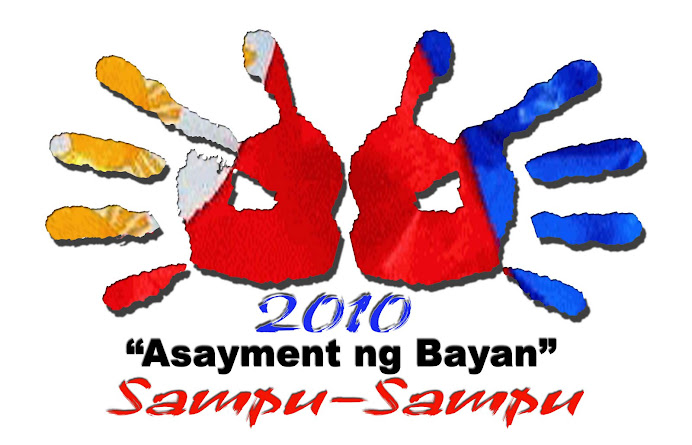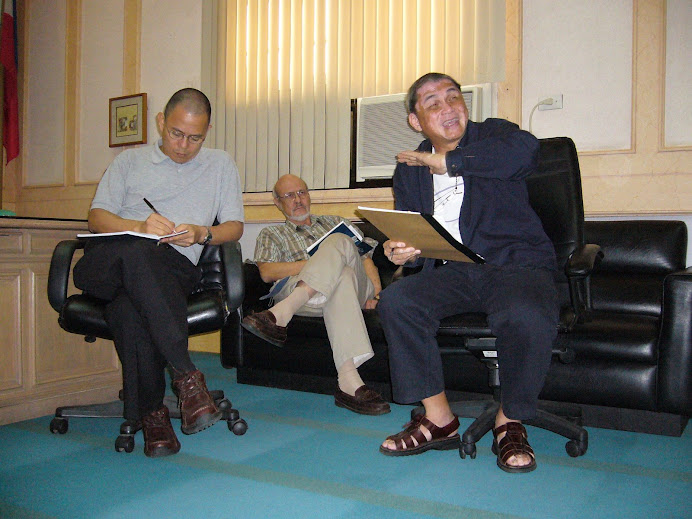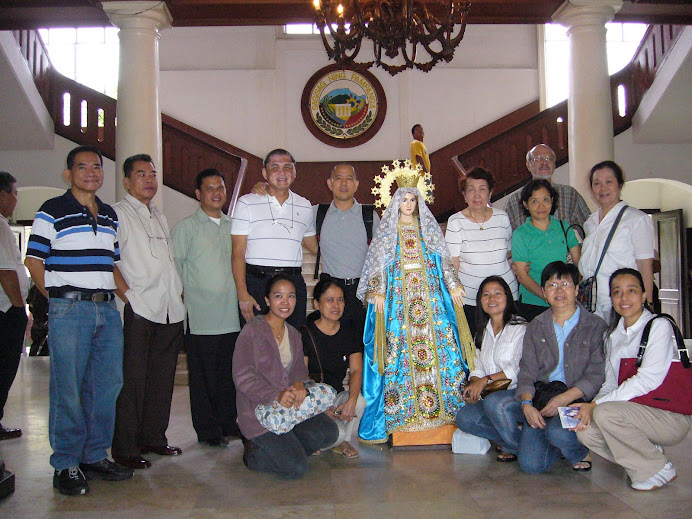Fr. Roberto P. Reyes
September 24, 2007
Life is beautiful. Life is precious, of inestimable value. Having it is a cause for celebration and thanksgiving. Losing it or facing the prospect of losing it is one of the most painful and difficult experience that faces us and those dear to us. Life is all about birth and death, beginnings and endings. We are all born and someday we also shall die. Yet even if death is certain, and inevitable, each one is born in hope and promise. Cris was born twenty years ago. His parents were filled with hope and fostered the promise innate in their child. Someday, Cris will be someone who will do them proud. Today we gather together to remember Cris. We remember him with both joy and sadness. Cris has died and the hope and promise of this one child of God seems to have died and gone with him. We mourn that lost and more, we are indignant for Cris’ life ended violently, wastefully and senselessly. This senselessness and wastefulness is evil and inhuman. It is the story of human arrogance and blindness. It is the story of a cycle that seems to endure for millennia. From the personal to the global, we witness the black senselessness and wastefulness of violence and the destruction and death it breeds. From frat violence to wars and the many kinds of violence in between, a burden grows and weighs upon us day after day. The story of Cris reminds us of the story of another man whose gentle and compassionate life questioned, challenged and denounced not only violence, but its very roots, the lust for power. This is the story of a man who carried and shared the burden of those who were victims of this idolatry that sought to replace God with man, love, truth, justice and peace with power. Chris reminds us of the story of Christ, a story of sacrifice meant to liberate the disempowered and to enlighten and hopefully liberate the slaves and idolaters of power.
More than two thousand years ago, he endured rejection, ridicule, torture and the ultimate punishment of a slow excruciating death on the cross. Yet, his was a peaceful and righteous life overflowing with justice, love and compassion. He was every inch a man of gentleness and dignity so infectious that many are drawn and inspired to look, listen, and touch even just his clothes. For indeed deep in his core is the essence of life, the form and substance of each breathing, living, human. This he brings and promises to share with all, “That all may have life, and have it to the full…” He knew a life so full whose thirst was quenched by the sweetest water that touched his lips like nectar and soothed his spirit as a mother’s voice would her hungry child. Yes, a mother knows what life is all about. Fathers also know it so well that words are superfluous compared to the rich eloquence of each tender, life-giving, sustaining act.
From all eternity, it was and will always be God’s will because it is what God is, and if we find God and remain in God as He did, we will find love. (John 15:10) Finding God is finding love and vise versa. Finding love is finding life and vise versa.
Cris Anthony Mendez knew this. He received life. He received love from his mother and father, whose own lives draw sustenance and vitality from its ultimate source, the Father. Cris, like all young UPeans came to UP sustained and inspired by this life source to seek more life both for himself and others as well. Cris must have noticed that quiet naked male figure standing with open arms and head slightly tilted back so as to look up both in supplication and oblation to the heavens. That beautiful muscular, strong and hardy body is no abstraction, distant and irrelevant. It stood for every young Upean, both male and female who similarly looks up asking to be blessed as she or he lifts chest and head to offer up mind, heart, spirit and body. University life will be just like this, an oblation of all that one is so that as he passes each single day in class, in the library, in the cafeteria, in the tambayans, in nearby parks and malls, he will move from life to more life, growing and developing himself so that one day, he could and would offer his life to neighbor, family, friends, humanity and yes to its very source, God.
More than 2000 years ago, that gentle young man reached the fullness of his mental, emotional, spiritual and physical faculties. He was ready and launched himself into the world to offer his gifts, his whole being to bring light, joy, peace, truth and justice into the world. He was filled with the spirit that propelled him to bring glad tidings to the poor, proclaim liberty to captives, recovery of sight to the blind, to let the oppressed go free…” (Lk 4:18-19). He was free and overflowed with a different freedom, not one that the world gave but rather different, deeper, and more complete. He moved amongst the sick, the hungry, the unlettered, the homeless, the lost, the poor and listened to them. They told him their stories and he felt and understood their deepest cries and longings, making these his own.
He walked the earth and shared the joys and pains of all. Each moment, he lived and moved without doubt and hesitation because his strength and direction, passion and motivation came from someone who knew him well more than a friend or teacher. He looked up and drew everything from His Father. Where teacher or friend may sometime fail in judging character, not His Father who knew him in his depth and loved Him completely and unconditionally.
The world he discovered and the people he encountered were strange and ambivalent. Even his closes friends, his own disciples. They followed him but later on also betrayed him. They listened to him and basked in his wisdom, only to hide themselves behind walls of darkness and fear. In His world, many sought the comfort and security of numbers. You were either a member of a group enjoying either fame or infamy or identified with individuals who were feared and respected. At the beginning, his charm and popularity attracted crowds and his intimate circle of supporters and followers. In the end as threats to his popularity and authority began to increase, many rapidly fell away and avoided him. He saw this, but he did not lose heart for he knew what and where his strength came from, for he like a mature and healthy branch was strongly attached to the vine. Even when persecution, arrest and death became imminent, he remained faithful to his call, and deeply grafted into the vine. He was like good seed planted in good soil, bearing fruit in due time, giving life and nourishment to those around. But good seed and good soil are not all. Jesus was born into a family of faith, fidelity and love. The witness of both parents, of father and mother provided the necessary environment and structure that cultivated and brought the seed into fruition and fruitfulness. They knew how to pray, to speak and listen to God at all times. They shared this with their son who grew in both filial devotion and fidelity to God. It has never been easy for his parents. They knew hardship and sacrifice which were not avoided but endured not for its own sake but for something greater, that they will understand and faithfully live out the holy will of God. From his parents’ sacrifice to his own. Slowly, he learns and more and more offers his own life as sacrifice. Yes, his own and never, never others as sacrifice. Like a farmer tending his grape vines, he also prunes dead branches, and the unwieldy, undisciplined ones as well. The pruning may be at times unpleasant, but they are always done gently with utmost respect and love. The Father prunes his son and his son also learns to prune himself.
“I am the vine and you are the branches,” says the Lord. I am the Lord and you are my slaves, says an unfeeling and unreasonable boss. If you want to join me, my group, my organization, my firm or my party, allow me, my companions to prune you Never, never, prune yourself. Trust me, trust us. I, we shall prune you and prune you well. Thus, you will learn how and why we sacrifice. The Roman Empire and the Church both towered over Jesus. The men who controlled both State and Church wielded power that seemed complete and absolute over individuals like Jesus. Power seemed to give men divinity and impunity. Clearly many have become blind because of the power they possessed. No one should be allowed to challenge and threaten that power. This is the reason for their “pruning.” It was a different pruning. It was in fact meant to control others while they slowly inflate the balloon of their authority and control.
The Gospel does speak of pruning but certainly of a different kind. It is pruning applied to oneself not by others but by one’s self attuned to the Father who awakens and enlightens us to see the ugliness of “idolatrous power,” that breeds selfishness, ambition and greed.
Today, we celebrate the Eucharist, the memorial of Christ’s Sacrifice on Calvary. It is an exemplary sacrifice, both symbolically and literally meant to be translated into every Christian life. It is the right sacrifice, of dying to one’s illusions of power and control, of dying to the many forms of violence, aggression and compulsion in our lives. Today, we reflect on the beautiful image of the “Vine and the Branches,” of our profound connectedness to God and our need to constantly renew that relationship less we fall victim to idolatrous power and violence. Today, we shall also witness the donation and dedication of a painting of an ex- UP Fratman and leader Joel Ferraris of Hong Kong entitled, “The Wrong Sacrifice.” The painting is the artist’s way of expressing his profound indignation and rejection of Frat violence and his appeal to frats to see the blindness, arrogance and vanity that have repeatedly led to senseless and wasteful deaths.
The centurion has a battle worn helmet but does not have a face. He has a sword but its edges are dull and jagged. He has a gold watch from which emanate money that eventually turn into chains. He has a shield that separates him from his victims. Beneath him is a reproduction of a scene from Juan Luna’s “Spolarium,” with dead gladiators being dragged out of the arena. Noticeably, the soldier wears a coat and tie. He seems honorable and dignified. Opposite and below the centurion, is his victim, a neophyte. His head is turned away from the centurion, as if to look back and ask if he could still turn back. There is a tear, a muted cry due to and against the agonies of torture. His face is sad and at the same time full of fear. His head carries a strange crown of olive leaves turning into questions and degenerating into maggots. A blindfold reveals one eye and the empty hollow of one socket of a skull. The other half of the neophyte’s body has already been consumed by death. The ribs on the left cage can be seen and the bones of the left arm and hand raised up to touch and receive the gold coins are discernible. A paddle and a sword in front of the neophyte seem to form a cross. The sword represents the distorted and erroneous doctrines forced into the neophyte’s head. The paddle represents the many forms of inhuman ways of initiating and hazing neophytes. On the paddle one sees the names of all those who perished in frat related violence at the University of the Philippines. To the lower left side of the neophyte is a child, the infant that was him. The hands are those of his mother gently holding this precious life, full of hope and promise. Over the child is the cross that brings the green light of life and hope, a welcome respite from the heavy red tones of the story of violence and idolatrous power on the other side.
Lastly, the UP Alumni Association of Hong Kong headed by Butch Durias wish to offer a modest donation to the family of Cris. They too wish to express their sympathies and their indignation as well over the violence that claimed another young UP life.
In front of the administration building we pass and behold the beautiful body of a young man gazing heavenwards with arms outstretched. We have a name for him, oblation. In many ways, this figure brings us back two thousand years ago when another man stretched out his arms to receive the nails that fastened his body to the cross. The sacrifice of this man is finished but ours continue. His sacrifice was noble and he continually asks us to ennoble our lives by making worthy sacrifices not of others but of ourselves for others. The University of the Cris, our University may yet become the University of Peace that is all of us learn the live and offer the right sacrifice.


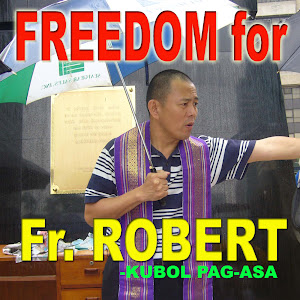+tarp+Fr.+Robert+3++copy.jpg)
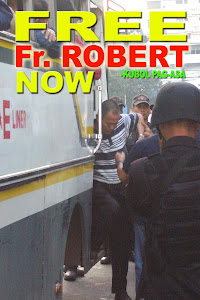+tarp+Fr.+Robert+2+copy.jpg)






